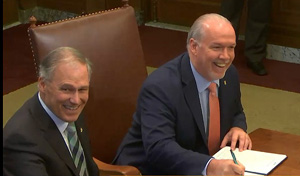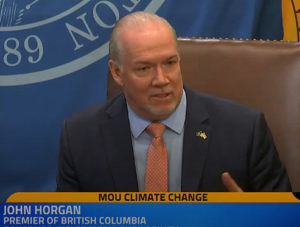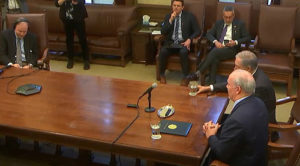
Friday, February 8, 2019 ~ WASHINGTON STATE / BC.
Today in Olympia, Washington, two west coast leaders presented a joint front against climate change and other shared common interests between BC and Washington State.
Both Premier John Horgan and Washington Governor Jay Inslee acknowledge an ‘artificial line’ between BC and Washington State, as they build their mutual working relationship between the two jurisdictions that – along with California and Oregon — comprise the Cascadia Corridor which Horgan says has the fifth largest economy in the world.
In a joint press conference this morning, Horgan and Inslee wrapped up a two-day interaction of meetings and discussions to “to rise to the challenge of climate change while investing in a sustainable, low-carbon economy”.
“We are honoured to have Premier Horgan visit Washington state,” said Inslee. “This meeting will build on the important work we’ve done together over the past few years,” he said.
Horgan’s two-day trip to Washington state February 7-8 includes speaking engagements and meetings with government and business leaders in Seattle and Olympia, including Microsoft and the Seattle Chamber of Commerce. Premier Horgan was scheduled to give a formal address to the Washington state legislature today Friday February 8, but the speech was cancelled due to snow. It will be rescheduled for a future time.
Today Premier Horgan signed on to the Statement on Stepping Up Climate Ambition. The states of Washington and California, the Government of Canada and other governments, as well as agencies from around the globe, have supported the statement, which emphasizes the need to increase ambition and strengthen efforts to tackle climate change.

The Statement on Stepping up Climate Ambition is in response to a report by the United Nations’ Intergovernmental Panel on Climate Change (IPCC) on the impacts of global warming of 1.5 Celsius. It reflects signatories’ determination to step up climate ambition in order to achieve the long-term goal of the Paris Agreement of holding global warming to below 2 Celsius and pursuing efforts to limit the temperature increase to 1.5 Celsius.
“Washington and British Columbia share so much, from our natural beauty to our innovative economies. This visit is a great opportunity to for us to come together to advance substantive and concrete proposals to advance our common interests,” said Inslee.
“BC and Washington state are taking important steps forward together to fight climate change, grow the innovation economy and build a sustainable future,” said Premier Horgan. “I’m very optimistic about what we can achieve to make life better for the people who live in the Pacific Northwest.”
Both BC and Washington State introduced climate action plans in December 2018.

Governor Inslee has proposed a plan to the state legislature that would accelerate innovation and efforts already underway across the economy to transition to 100% clean energy, construct ultra-efficient buildings, establish a clean fuel standard, electrify the state’s transportation system and phase down super-pollutants in certain products.
A task force has started looking at joint discussion about developing a high speed transportation corridor to which BC has contributed $300,000.
There is also mutual effort in recovering and protecting resident southern orcas. Horgan said that protecting and expanding the southern resident orcas requires work on the fundamental food source of the whales which is Chinook salmon. For the sake of “Indigenous communities, the economy, bears, forests… we have a responsibility to work together on those issues”.
During this two-day visit, Horgan and Inslee discussed the economies in WA and BC. Horgan met with clean tech alliances and visited a tech facility at the University of Washington at which UBC has participated and some BC companies have participated.
Horgan said that the USMCA (NAFTA 2.0) is a critical document but “creates irritants” between the two federal governments, including “softwood lumber disputes, and tariffs on steel and aluminum that adversely affect the ability of our efforts to work as sub-national governments together”.
“We believe passionately in the Cascadia corridor combining WA, CA, Oregon and BC,” said Horgan. “It’s the fifth-largest economy in the world. We have so much in common and so little that divides us. Issues will come and issues will go, and issues often divide people, but values always unite people. The common values that the Governor and I share and the people of our two jurisdictions share, will bind us now and in the future,” the BC Premier said.
Horgan told media in Washington this morning (available by web-livestream): “We talked about salmon and shared responsibility for the environment.” That includes salmon, air quality, forestry, traditional and emerging economies, and how unemployment rates are low. He outlined how people are coming to the Pacific northwest for the natural beauty but also for economic opportunity. “We need to prepare for that and do it in a way that is sustainable.”
Climate change “is the challenge of our time”, said Horgan. “Washington was adversely affected by the worst fire season in BC season in 2017, followed by worst fire season ever in 2018. We have shared interests – not just wildlife, forestry, and orcas … it’s the whole package” that impacts a continued sustainable economy for current and the influx of future residents.
“Last year we were breathing BC,” said Inslee, referring to the heavy smoky skies that resulted from extended forest fires in BC in summer 2018. “If we don’t want to breathe burning BC we need to look to them for their success in reducing carbon pollution that is consistent with economic growth. We have confidence in BC and ourselves on fighting climate change. BC and Washington are exhibits A and B to the world in terms of fighting climate change.” the Washington governor said today.
“We’ve had carbon pricing for a decade without any appreciate impact,” said Premier Horgan. “We help low and middle income people with any increased costs they may have. It’s so second-nature in BC. Carbon pricing is a challenge for many communities, but will say that 10 years of climate action that involves carbon pricing has not impeded our economic development one bit, in fact it has enabled opportunities for new and emerging economies and new emerging jobs high skilled, high paying jobs, family supporting jobs. I don’t feel we should be fearful of the future we should be optimistic as British Columbians and Washingtonians are,” John Horgan said.
More:
In 2016, Gov. Inslee, along with Gov. Andrew Cuomo of New York and Gov. Jerry Brown of California, founded the U.S. Climate Alliance which includes 20 governors, representing 47% of U.S. population, and is committed to taking action that urgently addresses the climate challenge. In 2016, the IPCC strengthened its regional collaboration network with the addition of the cities of Los Angeles, Oakland, Portland, San Francisco, Seattle and Vancouver, BC through the Pacific North America Climate Leadership Agreement.
CleanBC was launched by the BC government on Dec. 5, 2018. The plan is designed to help BC lower greenhouse gas emissions and seize new, clean-economy opportunities. CleanBC helps British Columbians use more clean and renewable energy in how they get around, heat their homes and fuel industry – setting BC on the path to a cleaner, brighter future. The goal is to reduce climate pollution while creating more jobs and economic opportunities for people, businesses and communities.
On Oct. 10, 2018, Premier Horgan and Gov. Inslee signed a memorandum of understanding to act jointly to grow the region’s innovation economy, protect the environment and combat climate change, promote trade and improve transportation connectivity.
The governments of British Columbia and Washington state are part of the Pacific Coast Collaborative with Oregon and California. In 2013, California, Oregon, Washington and British Columbia set the IPCC on its current course of ambitious climate and clean energy policy by signing the Pacific Coast Action Plan on Climate and Energy, which was updated three years later as the Pacific Coast Climate Leadership Action Plan.
Links:
Stepping Up Climate Ambition statement: https://news.gov.bc.ca/files/Statement_on_Stepping_Up_Ambition.pdf
Washington state’s Dec. 10, 2018, announcement of its clean energy policy:
https://medium.com/wagovernor/clean-electricity-clean-buildings-and-clean-transportation-inslee-plan-would-launch-19d789c99334
CleanBC plan: https://cleanbc.gov.bc.ca/
Pacific Coast Collaborative: http://pacificcoastcollaborative.org/
Cascadia Innovation Corridor: http://connectcascadia.ca/


